“Martial arts” is a pretty broad qualifier, as far as film genres go—we’re talking samurai (chambara) films and pulpy kung-fu dubs, modern historical epics and blockbuster videogame fodder alike. Which is why we’ve found the best of the best streaming on Netflix and listed them here, all with the hope that you’ll like what you see and really seek out some deep-cut classics when you next peruse your local indie film store. There are a few gems here on Netflix streaming, largely in the wuxia and modern action subgenres … plus a sprinkling of stars like Scott Adkins and Joe Taslim.
Here are the best martial arts movies on Netflix right now.
The Matrix

 Year: 1999
Year: 1999
Director: Lana and Lilly Wachowski
Stars: Keanu Reeves, Laurence Fishburne, Carrie-Anne Moss, Hugo Weaving, Joe Pantoliano
Rating: R
Watch on Netflix
There is little to add about what’s been already codified about the film that made cyberpunk not stupid—and therefore is the best cyberpunk movie of all time, amidst its many accomplishments—or that made Keanu Reeves a respectable figure of American kung fu, or that finally made martial arts films a seriously hot commodity outside of Asia. The story of a computer hacker who woke up to the reality that everything he knows is an illusion constructed to placate humanity under the reign of a super-race of robot squids, The Matrix is—next to the Wu-Tang Clan—what proved to a new generation that martial arts films were worth their scrutiny, and in that reputation is bred college classes, heroes’ journeys and impossible expectations for special effects. Even today we still have this film to thank for so much of what we love about modern kinetic cinema, about how malleable genius science fiction can be, about just how deeply our connection to mythmaking—to the religiosity of civilization’s symbols—can reach. This is our red pill; everything else is an illusion of greatness and everything else is an allusion to what the Wachowskis accomplished, including the two sequels—bloated and beautiful and unlike anything anyone could have expected from the relatively self-contained original—which in turn earned the distinction of setting the course for every multi-part franchise to come —Dom Sinacola
Warrior

 Year: 2019-2023
Year: 2019-2023
Stars: Andrew Koji, Olivia Cheng, Jason Tobin, Kieran Bew, Dianne Doan, Dean Jagger, Joanna Vanderham, Tom Weston-Jones, Hoon Lee, Joe Taslim
Watch on Netflix
It’s not a movie, but we would be remiss in leaving Warrior off any list highlighting martial arts content available on Netflix. Starting on Cinemax in 2019, Warrior paints a sumptuous portrait of 1870s San Francisco as a fresh-off-the-boat Chinese immigrant named Ah Sahm (Andrew Koji) is baptized into the drug-fueled criminal underworld of Chinatown, where dueling gangs called tongs maintain a delicate power struggle. Set against waves of anti-Chinese sentiment and racism, Warrior follows Ah Sahm and an incredibly deep array of supporting characters from the top to bottom of San Francisco society as they use their brains and fists to rise and fall in station. It’s a series we’ve referred to as the best and most underappreciated action show on TV, with brutally hard-hitting choreography and some of the best art direction of any recent period piece. Here’s hoping Netflix eventually gives it the season 4 it truly deserves. —Jim Vorel
TV’s Finest Action Series, Warrior, Is Now on Netflix. Let’s Get it a Final Season
Bullet Train

 Year: 2022
Year: 2022
Director: David Leitch
Stars: Brad Pitt, Joey King, Aaron Taylor-Johnson, Brian Tyree Henry, Andrew Koji, Hiroyuki Sanada
Rating: R
Watch on Netflix
What can I say about Bullet Train? Well, Hiroyuki Sanada is in it as a sage old warrior. Despite being based on a novel by Japanese author K?tar? Isaka, Sanada’s presence feels like an analogy for the film’s relationship with Japanese culture. Sanada was the samurai that bullied and trained Tom Cruise in The Last Samurai. He’s Scorpion in the most recent Mortal Kombat. He’s the Yakuza that Hawkeye kills in his global quest for justice (read: murdering non-white criminals) in Avengers: Endgame. He’s opposite Hugh Jackman in The Wolverine. Where on that iffy continuum of American films engaging with Japanese culture does Bullet Train fall? It’s a surprisingly complex question when asked of a film that is at times too clever, but lacks depth or innovation, unlike a real bullet train. A lack of innovation in and of itself isn’t a failure if the execution is spectacular, but Bullet Train uses a familiar tale of murderers clashing along intersecting storylines centered on a couple of objects to demonstrate another familiar tale: Plenty of flash and too little substance. Bullet Train will be a rewarding ride for some, but I’m not sure they should have let it leave the station. —Kevin Fox, Jr.
Kill Bill Vol.1, Vol. 2
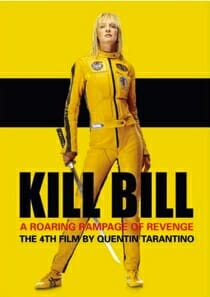
 Year: 2003, 2004
Year: 2003, 2004
Director: Quentin Tarantino
Stars: Uma Thurman, Lucy Liu, Vivica A. Fox, David Carradine, Daryl Hannah
Rating: R
Watch on Netflix
The greatness of Kill Bill Vol. 1 was in its finely tuned balance between acting as an homage to classic martial arts movies (both Chinese and Japanese) and as a blistering entry into the genre canon on its own visceral, offbeat merits. In the early 2000s, there was perhaps no cinematic experience like it (well, at least until Vol. 2 arrived). The gory but graceful tea house battle with the Crazy 88; the intensely claustrophobic kitchen showdown—these are only two excellent examples of everything that makes a martial arts movie superb. That Tarantino filled two movies with this stuff of greatness makes for some truly transcendent viewing. —K. Alexander Smith
Shadow
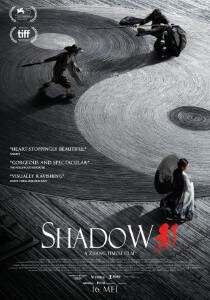
 Year: 2018
Year: 2018
Director: Zhang Yimou
Stars: Chao Deng, Sun Li, Ryan Zheng, Qianyuan Wang, Xiaotong Guan, Wang Jingchung
Rating: NR
Watch on Netflix
Zhang Yimou’s latest is Shadow, a wuxia film based on the Chinese “Three Kingdoms” legend. Where Yimou’s recent filmography either favors substance over dazzle (Coming Home) or dazzle over substance (The Great Wall), Shadow does what the best of his movies do by sewing them together into one seamless package. As in Hero, as in House of Flying Daggers, the anti-gravity fight scenes are stunning to behold, but those movies put performance and action on the same plane, and Shadow deliberately separates them with a gorgeous monochrome palette, backgrounded by gray scale that lets the actors, and the copious amount of blood they spill throughout, hold its forefront. Here, in this tale of palace intrigue, Commander Yu (Deng Chao) employs a double to act in his stead (also Deng Chao)—his shadow, if you will—to seize control of a city of strategic value from invading forces against orders from his king (Zheng Kai). The film twists and turns, but through Zhang’s devoted stylization, the intricacies never overwhelm. Instead, the stylization does. —Andy Crump
Everything Everywhere All At Once

 Year: 2022
Year: 2022
Director: Daniel Kwan, Daniel Scheinert
Stars: Michelle Yeoh, Stephanie Hsu, Ke Huy Quan, James Hong, Jamie Lee Curtis, Jenny Slate, Harry Shum Jr.
Rating: R
Watch on Netflix
Everything Everywhere All At Once follows Evelyn Wang (Michelle Yeoh), a jaded, middle-aged laundromat owner who may or may not be involved in some minor tax fraud. Her tedious, repetitive life is thrown into total pandemonium, however, when her husband, Waymond (Ke Huy Quan)—or at least a version of him—alerts her to the existence of the multiverse on the elevator ride to an IRS meeting. He then explains that a powerful villain named Jobu Tupaki is in the process of constructing a universe-destroying force that only Evelyn has the ability to stop. And so Evelyn reluctantly plunges headfirst into the multiverse. The facts: There are an infinite number of universes that exist simultaneously, containing just about anything you could possibly imagine. The rules: To acquire different skills, you must picture a universe in which you inhabit that skill, whether it be inhumanly strong pinky fingers or a mastery of knife-fighting. (If you can think it up, it exists.) What follows, then, are roughly 140 frenetic minutes filled to the brim with dense, complex science, colorful setpieces and scenes that feel like they’ve been pulled straight out of dreams far too abstract to describe. As you can probably gather, Everything is not dissimilar to its title—and a lot to wrap your head around. If all this sounds intimidating (which, let’s be honest, how could it not?), rest assured that Everything is grounded by an effortlessly simple emotional throughline. Indeed, the film contains as much emotional maturity as it does cool concepts and ostentatious images (yes, including a giant butt plug and raccoon chef). At its core, it is a story about love and family, carried by the dazzling Yeoh in a subtle and unsentimental performance. Where Everything’s emotional throughline is Evelyn’s relationship with her family, its visual thread manifests as a series of hypnotic, vertiginous action sequences, choreographed like a ballet by Andy and Brian Le. As a bonus, these sequences recall Yeoh’s iconic role in Ang Lee’s wuxia film Crouching Tiger, Hidden Dragon. The directors do not shy away from the use of dizzying flashing lights, or rapidly shifting light sources that disorient the viewer. They also aren’t afraid to implement over-the-top images, like a person’s head exploding into confetti or a butt-naked man flying in slow-motion toward the camera. At the same time, movement between ‘verses feels seamless through Paul Rogers’ meticulous editing, as does the effortless fashion in which different aspect ratios melt into one another. If Everything Everywhere All at Once can be boiled down to one, simple question, it would be reflexive of its own title: Can you really have everything everywhere all at once? Whatever the characters’ answers end up being (I’ll let you discover that on your own), I am certain that the Daniels would say yes, of course you can.—Aurora Amidon
The Night Comes for Us
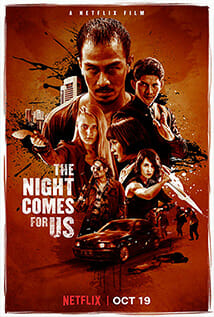
 Year: 2018
Year: 2018
Director: Timo Tjahjanto
Stars: Joe Taslim, Iko Uwais, Julie Estelle, Sonny Pang
Rating: NR
Watch on Netflix
While Gareth Evans confounded fans of The Raid movies by giving them a British folk horror film (but a darn good one) this year, Timo Tjahjanto’s The Night Comes for Us scratches that Indonesian ultra-violent action itch. Furiously. Then stabs a shard of cow femur through it. Come for the violence, The Night Comes for Us bids you—and, also, stay for the violence. Finally, leave because of the violence. If that sounds grueling, don’t worry, it is. You could say it’s part of the point, but that might be projecting good intentions on a film that seems to care little for what’s paving the highway to hell. It’s got pedal to metal and headed right down the gullet of the abyss. It’s also got the best choreographed and constructed combat sequences of the year, and plenty of them, and they actually get better as the film goes along. There’s a scene where Joe Taslim’s anti-hero protagonist takes on a team inside a van, the film using the confines to compress the bone-crushing, like an action compactor. Other scenes are expansive in their controlled chaos and cartoonish blood-letting, like Streets of Rage levels, come to all-too-vivid life: the butcher shop level, the car garage level and a really cool later level where you play as a dope alternate character and take on a deadly sub-boss duo who have specialized weapons and styles and—no, seriously, this movie is a videogame. You’ll forget you weren’t playing it, so intensely will you feel a part of its brutality and so tapped out you’ll feel once you beat the final boss, who happens to be The Raid-star Iko Uwais with a box-cutter. It’s exceptionally painful and it goes on forever. Despite a storyline that’s basically just an excuse for emotional involvement (Taslim’s character is trying to protect a cute little girl from the Triad and has a lost-brotherhood bit with Uwais’s character) and, more than that, an easy way to set up action scenes on top of action scenes, there’s something about the conclusion of The Night Comes For Us that still strikes some sort of nerve of pathos, despite being mostly unearned in any traditional dramatic sense. Take it as a testament to the raw power of the visceral: A certain breed of cinematic action—as if by laws of physics—demands a reaction. —Chad Betz
Avengement
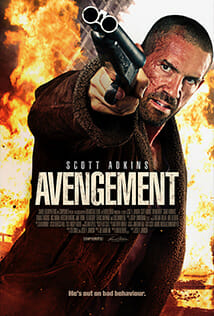
 Year: 2019
Year: 2019
Director: Jesse V. Johnson
Stars: Scott Adkins, Craig Fairbrass, Thomas Turgoose
Rating: NR
Watch on Netflix
The second of three films directed by Jesse V. Johnson released in 2019, Avengement is as crystalline, as empirically precise, as micro-budget VOD martial arts action can aspire. With that kind of prolificacy, a journeyman director’s bound to do something right—which would be a valid assessment, were everything Johnson’s done not so undeniably solid. Thanks goes, of course, to Johnson’s muse, Vicious Beefcake Scott Adkins, a flawlessly sculpted humanoid so squarely planted in Johnson’s sweet spot—melodramatic, archly brutal action cinema with enough wit and heart to leave a bruise—a Johnson film without him as the protagonist doesn’t quite feel fully realized. Look only to Triple Threat, Avengement’s 2019 predecessor, to yearn for what could have been, mollified by a scene in which Adkins body slams a sedan going at least 40 mph. Triple Threat boasts three writers and a cavalcade of international action cinema stars, from Iko Uwais and Tony Jaa, to Tiger Chen and Michael Jai White (still in decent shape, but so outclassed by Adkins and his peers’ athleticism he seems pretty much immobile), while in Avengement Johnson works from his own script, winnowing the plot to a series of increasingly higher stakes brawls as wronged nobody Cain (Adkins) makes his bloody way through the criminal organization (led by his brother, no less) that left him to rot in prison. As is the case with Savage Dog and The Debt Collector (both on Netflix), Avengement thrives on the preternatural chemistry between director and star, the camera remarkably calm as it captures every amazing inch of Adkins in motion, beating the living shit out of each chump he encounters, Adkins just as aware of how best to stand and pose and flex to showcase his body. Charming character actors cheer from the sidelines; the plot functions so fundamentally we hardly realize we care about these characters until we’ve reached a satisfying end at their sides. Perhaps Scott Adkins is a better dramatist than we’ve come to expect from our kinetic stars anymore. Perhaps we’ve set our expectations too low. —Dom Sinacola
RRR
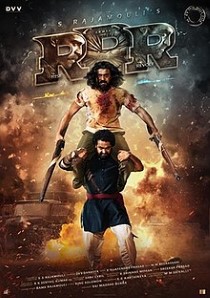
 Year: 2022
Year: 2022
Director: S.S. Rajamouli
Stars: Victoria Justice, Adam Demos, Luca Sardelis, Samantha Cain
Rating: TV-14
Watch on Netflix
This action-packed historical drama is the most expensive film in Indian history and already one of the biggest box office hits. N.T. Rama Rao Jr. and Ram Charan play two Indian revolutionaries pitted against the imperial British Raj. Released in March of 2022, RRR (Rise, Roar, Revolt) follows the two men and their very different paths to revolution. Komaram Bheem (Rao) is the champion for a rural tribe trying to rescue a stolen daughter and Alluri Sitarama Raju (Charan) is the police officer tasked with catching him when the pair form an unwitting friendship after teaming together in a daring rescue of a young boy. But this is Bollywood, so while trying to fulfill their opposing missions, they also show up arrogant British officers with a full-fledged dance off. It’s a riotously fun and twisty journey celebrating two heroes of Indian independence. —Josh Jackson

 Year: 2017
Year: 2017
Director: Timo Tjahjanto, Kimo Stamboel
Stars: Iko Uwais, Sunny Pang, Chelsea Islan, Julie Estelle, Zack Lee, Very Tri Yulisman, David Hendrawan
Rating: NR
Watch on Netflix
Anyone familiar with the tropes of this kind of flick can pretty easily guess that Ishmael (Iko Uwais) is a veritable killing machine, a man bred to wreck any poor bastard fool enough to tangle with him. The film takes his backstory beyond the edges of obviousness, though, eventually landing somewhere in the same neighborhood as movies like Louis Leterier’s Unleashed (a.k.a. Danny the Dog), where childhood innocence is tied to adult barbarity. Headshot is surprisingly melancholic, an actioner built to break hearts as easily as Uwais breaks bones, characters paying for the crimes of their past with their lives in the present. In several instances, innocent people end up paying, too: Lee’s thugs hijack a bus on its way to Jakarta, intending on finding Ishmael. When they realize he isn’t aboard, they murder the other passengers and burn the evidence, which just adds to Ishmael’s moral onus. Odds are that you’re not tuning into Headshot for the story, of course. The good news is that the film delivers in the ass-kicking department. The better news, perhaps, is that Tjahjanto and Stamboel have outdone Gareth Evans’ The Raid 2’s bloated fusion of story and action. Headshot clocks in at only 118 minutes and spaces out narrative beats and beatings beautifully, developing the harrowing truth of Ishmael’s upbringing without either belaboring the point or denying the audience the thrill of unhinged but precisely choreographed martial arts violence. Broad swaths of the action movie canon are fist-pumping shindigs that celebrate good guys serving bad guys their just desserts. In Headshot, as in the films of Evans, the action snatches the breath out of our lungs. The end of each fight relieves us of our ratcheting anxiety. Coupling that dynamic with the emotional substance of Ishmael’s existential woe makes the film a soul-rattling, hand-wringing affair made with Tjahjanto and Stamboel’s daringly aggressive sense of craft. You’ll nearly wish that more filmmakers shot action movies the way this duo does—but your nerves probably couldn’t take it if they did.—Andy Crump

